#Oberlin College Alumni
Text
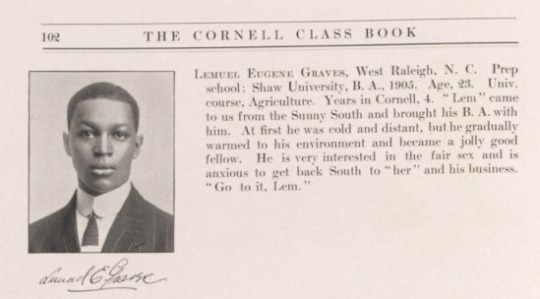
Lemuel Eugene Graves (February 22, 1882 - 1957) was from Raleigh. Born to Willis and Eleanor Graves and were active leaders in Oberlin. He studied at St. Augustine’s Normal School and Shaw University and earned an AB. He was unanimously selected to be one of the first initiates for October 30, 1906, to Alpha Phi Alpha Society. He provided entertainment with a selection at the Zion Church bazaar. He was appointed to the Committee of Constitution and By-laws. He was involved in research of the Fraternity pin; and served on the 1st Shingle Committee and Committee on Chartering the Fraternity. At the 2nd Initiation Banquet (October 26, 1907), he spoke on “What Does College Life Mean”? He was selected as a Trustee during the incorporation on January 25, 1908. He served as Secretary and was appointed to set up the Eta Chapter at Columbia University with Brother Roscoe Conkling Giles. His name was listed in the formation of the Iota Chapter at Syracuse University. He was a delegate at the 2nd Annual Convention in Richmond, Virginia, Dec. 27-29, 1909. He graduated from Cornell in 1910 with a BS in Agriculture. He held a strong association with the Fraternity that included the Alumni Chapter in 1916 in Tallahassee and was a Professor of Botany (at A&M College Tallahassee.
He was present at the Initiation Banquet at the Delta Lambda Chapter in Atlanta, on July 15 1919 now Eta Lambda. He returned to Raleigh working in real estate and insurance, he was secretary and General Manager of Eagle Life Insurance. He held leadership positions in organizations including the Negro Business League, Negro Welfare Ches. and Raleigh Emancipation Society, and served on the board at St. Augustines.
He moved his family to Harlem and continued to work in real estate in the heightened era of the Harlem Renaissance. #africanhistory365 #africanexcellence #alphaphialpha
0 notes
Text
This is a viewpoint editorial by Peter Conley, an item supporter at Vercel. Education is totally free. It has actually been for several years now. In my self-directed pursuit of understanding Bitcoin, I've required myself to read more than in any other duration in my life. More than any previous task, more than all of my undergraduate experience and more than my full-stack web advancement program at Bloomtech. In essence, I found out more from "Bitcoin College" than from "genuine college." With the Student Loan Debt Relief Plan at the leading edge of everybody's minds, it's bringing lots of terrific concerns to the surface area: Is $80,000 for the product you can secure free on the web worth the cost of the qualifications it manages you? Aren't most undergraduate experiences simply four-year-long binge drinking trips that do not teach you pertinent task abilities? Why are these service teachers who do not own a company mentor trainees about organization? Why the fuck is Keynesian economics still the standard? Is there a much better method? To address the last concern: Yes, I think so. Before I set out a vision for a specialized college option focused around Bitcoin, let's unload the existing college item package. Institutions will argue that "you get a lot more than an education!" This can be real, however let's explore what that "more" really is and how it can be offered à la carte. The Standard College Product Bundle Information And Knowledge The huge bulk of the understanding you get in college is from teachers who have not taken part in the free enterprise for several years. The books you check out have no reward to offer sincere feedback or modifying since colleges need trainees to acquire them despite the precision of their material. The cold, difficult reality is details has actually been commoditized and has actually been packaged into ones and nos on permissionless servers you can access at will; it's successfully complimentary on the web. Furthermore, I can make an excellent argument that the understanding you discover at university, by its style and reward design, can't take on the details on the web. Social Life And Personal Development A normal university student has dreadful sleep health, consumes processed foods, beverages to get intoxicated and lives for the weekend. As a trainee, you automatically get lessons on nutrition, dating and way of life from "grownups" who are 4 to 7 years far from having actually totally formed brains. And they call this a greater academic environment? The only thing I found out in college was how to reduce my feelings with alcohol. Yes, accountable trainees exist, however they aren't the bulk. Environment A great deal of dormitories were integrated in the 1960 s and might be misinterpreted for jail barracks. Plus you're spending for all the centers, features and facilities you never ever utilize and do not offer a shit about. It's all one huge package. Take it or leave it. Of course, some schools are stunning, and some top-tier schools do have good living centers, however they are the minority. Most awful of all, they're stuck where they are developed; there's no optionality. You need to suffer 4 Boston winter seasons to sign up with the MIT alumni network. Alumni Network Alumni networks can definitely be a video game changer for your profession. The issue is that they follow a Pareto circulation, suggesting that the large bulk of the spoils go to the top, i.e., Ivy Leagues, Stanford, MIT, and so on The roi of paying $200,000 to be an alumnus of Kenyon or Oberlin lessens every year. All the while, the worth of a correct social networks following boosts. I do not understand about you, however I'm 100 times most likely to assist and get in touch with somebody I appreciate on Twitter than somebody I have absolutely no connection with that took place to finish from my university (SUNY Geneseo). I'm obviously the minority-- in the meantime, however human beings like to assist and deal with individuals who share their interests.
The unfortunate fact is I seldom shared typical interests with the 5,000 trainees I shared a college school with. How To Create A Better College Bundle-- For Bitcoiners What if we could develop a much better package? More affordable, more specific niche and trainees find out about the most essential possession of this century: bitcoin. The essays and material they develop while discovering will not be saved behind gated knowing platforms. Students compose to develop an online audience-- a better network than any university-- and to get important feedback to enhance their abilities. Here's my vision: Knowledge And Information All info will be complimentary. If a trainee wishes to check out " The Bitcoin Standard," I wager if we ask Dr. Saifedean Ammous he'll contribute as numerous as we require. We do not inform trainees particularly what to discover, they follow their natural interest-- as long as it's Bitcoin material-- however in order to really discover it and incorporate it, they need to produce their own material. They need to discuss what they discovered and share it openly, or podcast about it or develop a YouTube channel. Get feedback from the marketplace and enhance your interaction abilities. No more composing college essays that never ever see the light of day. Social Life And Personal Development You will prepare meat, you will not oversleep a pod and you will be upset that Modern Monetary Theory is still a thing. In all severity, you might produce a culture and structure for the trainees, focused around healthy practices rather of trashing your brain and gut. Of course, some 18- year-olds would pick Penn State over Bitcoin College to consume themselves into oblivion, however there will be a little market for a real individual advancement environment. This will more than likely weed out the lazy ones and draw in those that wish to grow and find out. How do you do this? You produce a market for similar trainees to link and you assist in getting them a physical environment in which to study. Environment Network impacts likewise work for finding out topics. Do not you believe that if you're attempting to discover French you 'd have more success if all your roomies just spoke French? You 'd just enjoy programs in French or with French subtitles. You 'd accelerate your speed of knowing, a minimum of. The exact same will hold true with discovering Bitcoin. In regards to physical area, you do not require to construct anything. You can simply lease it-- or it can be a complimentary area. Let me paint the image for you. Option A - Renting Find a trainee real estate aggregator like Unilodgers or perhaps a dormitory that has excess capability. You and your fellow Bitcoin trainees end up being roomies too. Option B - Local Learning Pods Perhaps there suffice Bitcoiners in the very same city and all they require to do is produce an "education pod," thus lots of did throughout COVID-19 The pod might be in the basement of among the trainee's houses, and even in a town library. All of it boils down to getting in touch with similar, excited trainees. How do you produce this physical network? With a market for a custom-made college experience, which is why I'm developing Unbundl.ed It's successfully Airbnb for college options. Alumni Network This might be the very best part. You'll be strolling into among the wealthiest alumni networks possible. Plus, Bitcoiners are the most enthusiastic and most forward-thinking network in the world. If a young adult methods me and states they went to my university I truly do not offer a shit, however if they inform me 50% of their net worth remains in bitcoin, I will go through walls to assist them. Making It A Reality Is this possible or is this simply an article? It's definitely possible. This neighborhood might do it. It's time to reclaim the world from the excessively schooled and grossly undereducated. This is a visitor post by Peter Conley. Viewpoints revealed are totally their own and do not always show those of BTC Inc. or Bitcoin Magazine.
Read More
0 notes
Text
#WCW: Katharine Wright Haskell
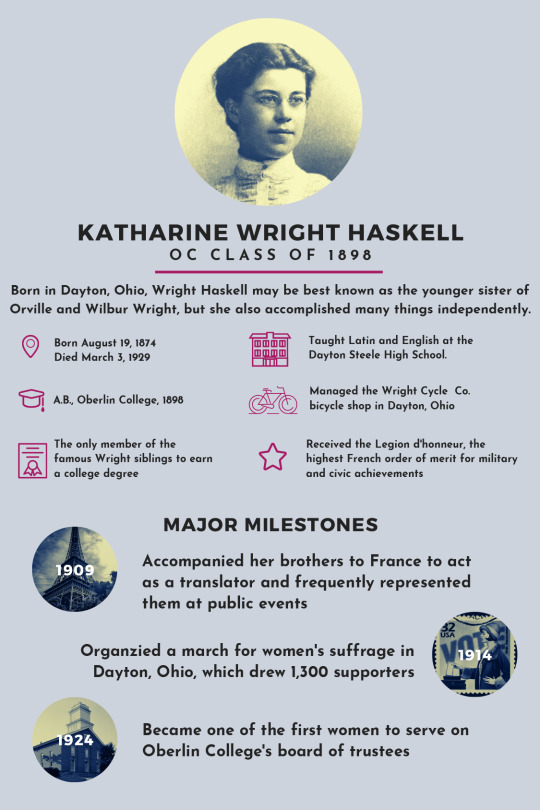
Above photo: Infographic depicting the information about Katharine Wright Haskell written in this post.
Katharine Wright Haskell, OC Class of 1898
Born in Dayton, Ohio, Wright Haskell may be best known as the younger sister of Orville and Wilbur Wright, but she also accomplished many things independently.
Born August 19, 1874; Died March 3, 1929
A.B., Oberlin College, 1898
The only member of the famous Wright siblings to earn a college degree
Taught Latin and English at the Dayton Steele High School
Managed the Wright Cycle Co. bicycle shop in Dayton, Ohio
Received the Legion d’honneur, the highest French order of merit for military and civic achievements
MAJOR MILESTONES
1909- Accompanied her brothers to France to act as a translator and frequently represented them at public events
1914- Organized a march for women’s suffrage in Dayton, Ohio, which drew 1,300 supporters
1924- Became one of the first women to serve on Oberlin College’s board of trustees
#oclwomeninleadership#wcw#Oberlin College#Oberlin College alumni#Obies#women in leadership#katharine wright haskell#Wright Brothers#OCLWomanoftheWeek
10 notes
·
View notes
Text
Oberlin Women in Leadership: Eleanor Gould Packard
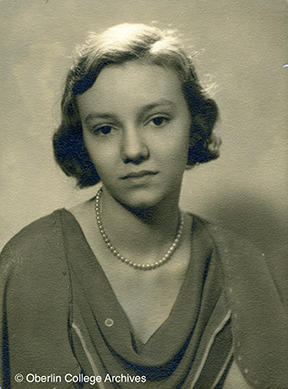
Eleanor Gould Packard (1917- 2005, OC 1938) was an editor and “Grammarian.” She graduated from Oberlin College in 1938 with a B.A. in English. Upon graduation Packard worked as a private tutor in Oberlin for a year before moving to New York City to work in the publishing industry. From 1940 to 1944 she was employed as an editor for the D. Appleton Century Company. Packard worked as an editor from 1944 to 1945 for Duell, Sloan & Pierce and for the Creative Age Press. In 1945 she applied for a job at The New Yorker noting two mistakes in the most recent issue of the magazine. Packard then became an editor and the “Grammarian,” for The New Yorker, a position she held for nearly fifty years. The title “Grammarian,” was invented for her because Packard was one of the last individuals to look at the magazine’s articles prior to publication, and she edited purely for grammatical errors, word flow and usage, logic, and punctuation. She retired in 1999. No other editor has held the “Grammarian,” title. Many people believed that the magazine’s illustrious style was a result of her editing.
Sources:
Student File (Eleanor Gould Packard), Alumni & Development Records, O.C.A.
#Oberlin#Oberlin College#Oberlin College Archives#oberlin college libraries#oberlin college alumni#women in leadership#the new yorker magazine
5 notes
·
View notes
Photo
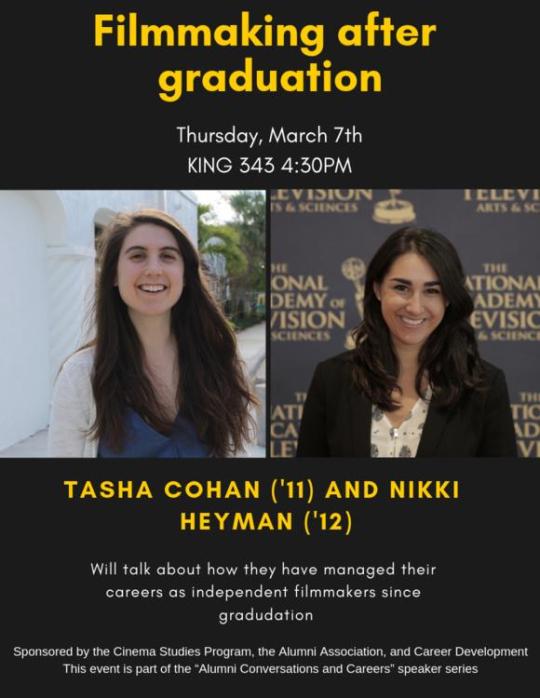
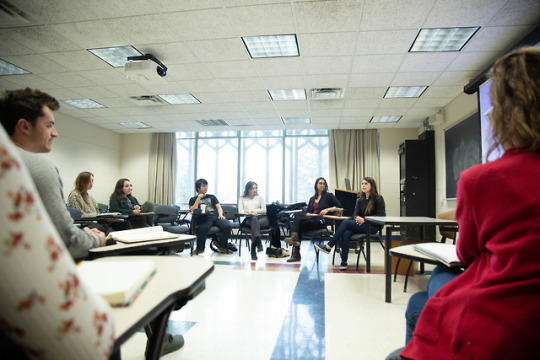

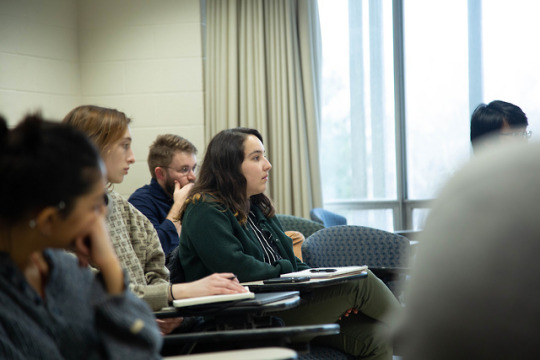
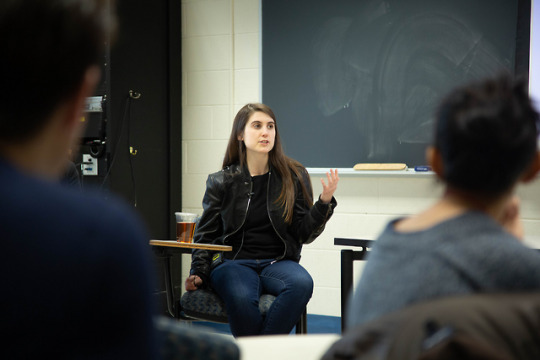
Campus Events: Filmmaking After Graduation
A talk on managing an independent film careers post-grad with alumni guests Tasha Cohan (11') and Nikki Heyman(12').
Read on for bios \/
Tasha Cohan (Class of 2011, Cinema Studies) is a Manager of Creative Affairs at A+E Studios. She develops drama shows for History, Lifetime and a variety of streaming and cable platforms. Prior to working at A+E Studios, Cohan earned a Master of Fine Arts in Screenwriting from Chapman University and worked at the Apple Store.
Nikki Heyman is the Co-Producer for POV where she curates and programs the features series, maintains relationships with and provides feedback to filmmakers, manages all series production (including original filmmaker interviews and promotional content) and deliverables, and supervises POV's media coordinator and interns. Nikki regularly represents POV at festivals, markets, and forums, and has served on panels and juries in the U.S. and abroad, including the True/False,Big Sky Documentary Film Festival, Nordisk Panorama, Sheffield Film Festival, and DOC NYC. Prior to joining the staff in early 2014, she was the documentarian for The Odyssey Initiative, a non-profit traveling education project. Nikki worked as a mentor and teacher at the Apollo Outreach Initiative in Ohio. She has served as an Assistant Director, Production Manager, and Camera Operator on professional
feature films and shorts, and has garnered award recognition for her
own documentaries. Nikki holds a Bachelor's degree in Cinema Studies
from Oberlin College.
Photo Credit: Oberlin College Via Flickr
1 note
·
View note
Text
Caroline Anderson-First African-American Physician
Caroline Still Anderson was one of the first African-American women to become a physician. She was born on November 1, 1848 in Philadelphia, Pennsylvania. Her parents were Letitia and William Still, two leaders in the abolitionist movement. William Still played an important role in the Underground Railroad of Philadelphia.

Caroline attended several prominent schools in Pennsylvania, as her father believed in a good education for women, and his business in the coal industry provided well for the family.
At the age of 19, Caroline was the only black student in her class at Oberlin College to graduate with a bachelor’s degree. She was also the first black woman to be elected as president of the college.
On December 28, 1869, Caroline married Edward Wiley, a former slave and graduate of Oberlin College, at the age of 21. The couple had five children, but only three survived to adulthood. Edward died in 1873 from a sudden illness In 1880, Caroline remarried Matthew Anderson, a minister and fellow alumni of Oberlin College, as well as Yale University and Princeton University.
After working as a teacher of music and elocution, Caroline went on to complete an internship in medicine at New England Hospital for Women and Children in Boston. After some opposition because of her race, Caroline was eventually appointed to a position at the hospital based on her work and talent as a physician. She went on to practice medicine at Quakers Institution in Philadelphia.
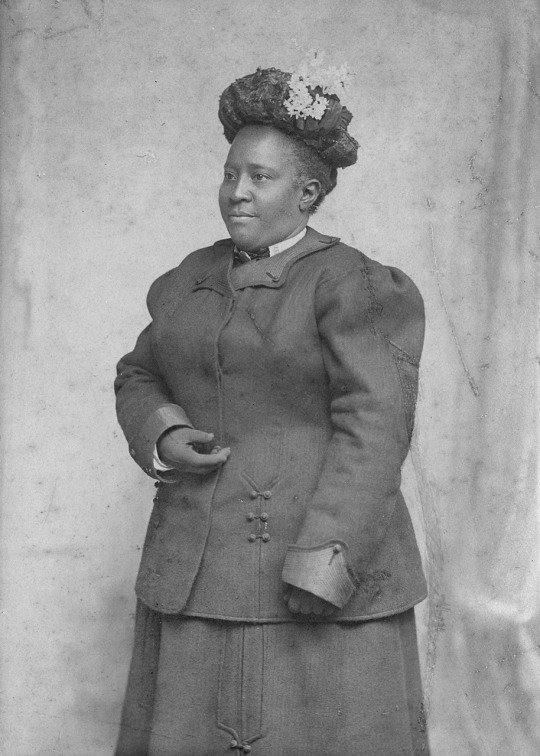
In her later years, Caroline became an activist working for organizations in Philadelphia that supported women’s rights and racial equality. She was instrumental in establishing the first black Young Women’s Christian Association (YWCA) in Philadelphia. Caroline continued to work tirelessly to help the black community in Philadelphia, until her death in 1919. She was also recognized for her efforts by W.E.B. Du Bois.
She died at the age of of 71 from stroke complications, and was buried in Eden Cemetery in Collingdale, Pennsylvania.

#Caroline Still Anderson#african-american history#physician#Pennsylvania#underground railroad#abolitonists#Philadelphia#slavery#civil war#fugitive slave law#juneteenth#juneteeth2020#New England Hospital#racial inequality#women's rights#civil rights movement#civil rights history#w.e.b. du bois#Quakers#black lives matter#blackl lives matter movement#Emancipation Proclamation
1K notes
·
View notes
Photo
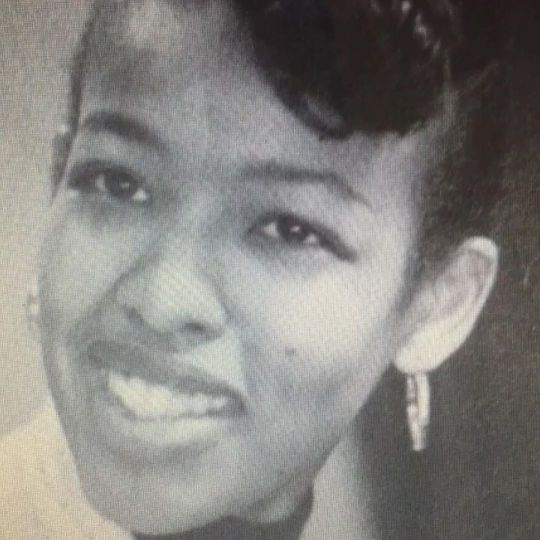
HAPPY HEALTHY BLESSED BIRTHDAY, MOMY!! (That’s how she spells it! 🤣) She was happy to hear my voice and her grand and great grand children today!!! 🎉🎉🎉
.
Monumental year 87!! This woman tirelessly fed, nurtured, raised, loved, supported, built up, inspired, taught, home trained, handcrafted for, instructed and empowered many people besides her relatives. Some didn’t listen and paid the price. Always listen to Momy, I always say…
.
She believes in people, she has faith in The Most High and she let me evolve, spiritually. She attended every one of my graduations and my Suns graduation from Oberlin College. She’s always been about education. I remember she took me to her college classes when she attended NY Tech, downtown Brooklyn. We lived in Laurelton at the time.
.
I can proudly say I shared her best and most vibrant years with her; going to Broadway plays, eating out, going to her alumni dinners, watching TV together, and attending her book readings. She’s a self published author of three books, that are dope.
.
My mother’s name is Constance and she is just that - a constant source of love, strength, support and inspiration. She made me want to prove the statistics wrong when I graduated Brooklyn Technical HS 6 weeks pregnant. She knew I could do it and I’ve kept her light inside of me. My children have her light and they too, let nothing stop their greatness.
.
THANK YOU, MOMY, for your unconditional love and encouragement. I couldn’t have accomplished half the things I did without you!!
.
THANK YOU, QUEEN!! I’ll always love my Momy, cause she’s my favorite girl! I got one of the best! Shukran Allah 💜🙏🏾
https://www.instagram.com/p/CFiaP5ygGIy/?igshid=1vyjk20lygfl3
3 notes
·
View notes
Photo
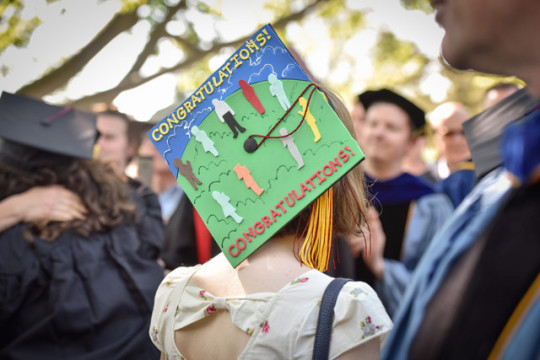
Share your Commencement/Reunion Weekend experience on social media for a chance to win a free Oberlin t-shirt! This year, awards will be distributed to alumni who Instagram and Tweet their reunion photos to the hashtag #ObieCRW during Commencement/Reunion Weekend. Award recipients will be selected by the Office of Communications and Office of Alumni Relations and will be announced on the Oberlin Alumni Facebook page on Wednesday, May 24.
Awards will be selected in the following categories:
Best Photo
Most Oberlin
That's So Meta
Most people in a group photo
Most Oberlin Swag in a photo
2 notes
·
View notes
Link
There are a lot of things about the way Oberlin College handled the Gibson’s Bakery dispute and lawsuit that have had me wondering who, if anyone, is in control over there.
As mentioned numerous times, “from the start of this case I have questioned the aggressive and demeaning attacks on the Gibsons as a defense strategy,” and “I’m still shaking my head at the tone-deafness of the defense in belittling this family business.” The jury seems to have agreed, rendering a combined $11.2 million compensatory damages verdict against Oberlin College and its Dean of Students, Meredith Raimondo.
The next stage is a punitive damages hearing, since the jury found the defendants acted with intent and malice. A separate punitive damages hearing is required under the Ohio Tort Reform legislation that passed several years ago. The point is to keep some of the more inflammatory evidence that does not go to liability or compensatory damages away from the jury during the initial deliberations. That additional evidence relevant to punitive damages could include information as to the wealth of the defendants, but also additional information supporting the need for punishment.
In this context, there is nothing more baffling than a statement sent to alumni after the verdict by Donica Thomas Varner, Oberlin College’s Vice President and General Counsel.
The statement was contained in a mass email sent to alumni (and possibly others) criticizing the jury verdict and repeating the same stale defenses that failed at trial (emphasis added):
Dear Members of the Oberlin Community:
I am writing to update you on the lawsuit that Gibson Bros., Inc. filed against Oberlin College and Vice President and Dean of Students Meredith Raimondo in the Lorain County Court of Common Pleas in November 2017.
Following a trial that spanned almost a full month, the jury found for the plaintiffs earlier today.
We are disappointed with the verdict and regret that the jury did not agree with the clear evidence our team presented.
Neither Oberlin College nor Dean Meredith Raimondo defamed a local business or its owners, and they never endorsed statements made by others. Rather, the College and Dr. Raimondo worked to ensure that students’ freedom of speech was protected and that the student demonstrations were safe and lawful, and they attempted to help the plaintiffs repair any harm caused by the student protests.
As we have stated, colleges cannot be held liable for the independent actions of their students. Institutions of higher education are obligated to protect freedom of speech on their campuses and respect their students’ decision to peacefully exercise their First Amendment rights. Oberlin College acted in accordance with these obligations.
While we are disappointed with the outcome, Oberlin College wishes to thank the members of the jury for their attention and dedication during this lengthy trial. They contributed a great deal of time and effort to this case, and we appreciate their commitment.
Our team will review the jury’s verdict and determine how to move forward.
Donica Thomas Varner
Vice President, General Counsel & Secretary
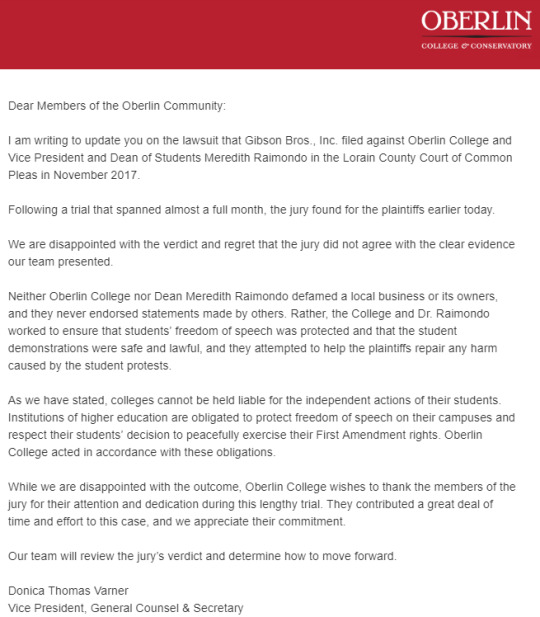
Procedurally, the email is baffling because the trial is not over. The jury will hear more evidence and render a verdict on punitive damages that could add another $22 million to the $11 million compensatory. The objective of any communications at this sensitive stage must be to first do no harm. That’s how Scott Wargo, Oberlin’s spokesman, handled it when contacted by me and other media after the verdict, indicating the college had no comment on the jury verdict. Wargo’s statement was the professional response one would expect in this circumstance, so why are others at the college not heeding that basic corporate communications strategy?
Substantively, the email is infuriating to anyone who has followed the case. Oberlin College and Raimondo were not “held liable for the independent actions of their students.” Rather, the defendants were held liable for their own conduct in aiding and abetting the publication of libelous documents, interference with business, and intentional infliction of emotional distress. Let me repeat, it was the college’s and Raimondo’s own conduct that was at issue before the jury. That the General Counsel of Oberlin College doesn’t understand that — even if she disagrees with the jury conclusion — tells me something went very wrong with the way this case was handled internally at Oberlin College.
Varner began serving as Oberlin College’s Acting General Counsel on June 5, 2017, and was appointed General Counsel in March 2018. Prior to that, she spent 15 years in the General Counsel’s Office at the University of Michigan. This means that while she was not at Oberlin College when the protests took place, she was General Counsel starting several months before the lawsuit was filed in November 2017. Given her position, she likely would have been the administrator at Oberlin College overseeing outside counsel’s handling of the case. Depending on what her role was in overseeing the failed litigation (effectively, she was the “client”), she may not be the best person to be involved in communications strategy post-verdict.
I saw this phenomenon when I was in private practice representing employees against securities firms, which usually had in-house counsel involved in termination decisions. When the in-house counsel who advised as to termination also showed up overseeing the litigation, I knew there were going to be problems because that person had an interest in defending his or her own termination advice, rather than providing a cold, disinterested litigation assessment.
We would have to know more about Varner’s involvement in overseeing the litigation. But if she was the key point person at the college as to the litigation strategy, she may not be the right person to handle corporate communications.
Someone with such deep experience as Varner should have known better than to send out such a statement in the middle of trial, particularly on the cusp of a punitive damages hearing. I understand the college felt the need to say something, but first do no harm. Simply send out a mass email, since alumni were going to hear about the verdict through the news, indicating that college cannot comment since the trial is ongoing, and that more information will be provided after the trial is over. Or express a vague regret at the verdict and respect for the jurors.
But for heaven’s sake, don’t make things worse.
Don’t accuse the jurors of disregarding the “clear evidence,” don’t repeat the same failed claim that the college administrators were simply keeping the peace and protecting free speech when numerous witnesses testified otherwise, and don’t claim the college was held liable vicariously when in fact the college’s own conduct was at issue.
The post-verdict email could be Exhibit A at the punitive damages hearing as to why the compensatory damages are not sufficient to send a message to Oberlin College and its administrators. Whether it will be an exhibit we’ll find out on Tuesday.
===================================
They didn’t help their case by going after the jurors. It’s like they’re trying to lose big.
16 notes
·
View notes
Photo
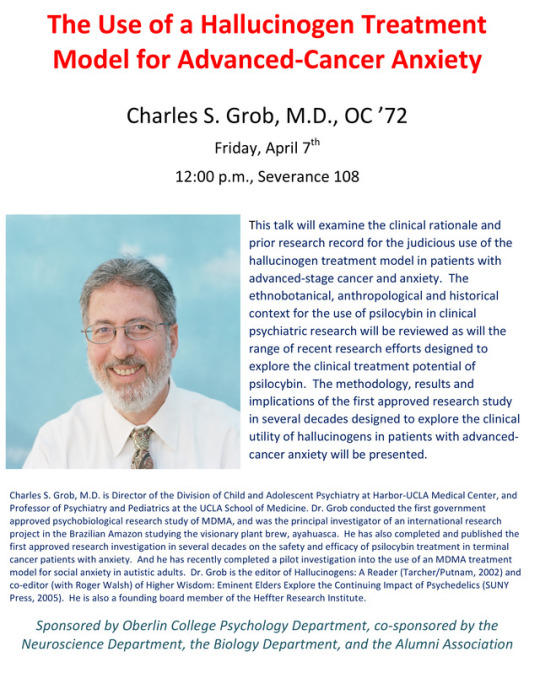
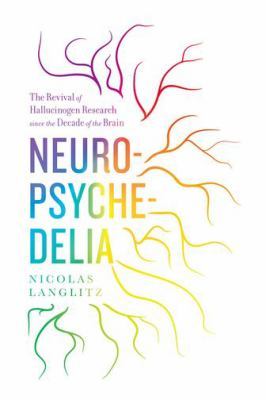
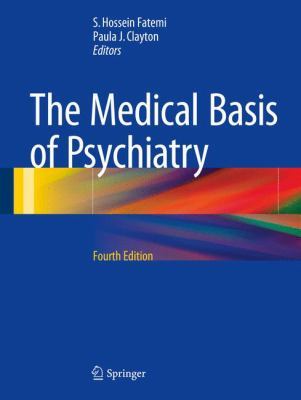
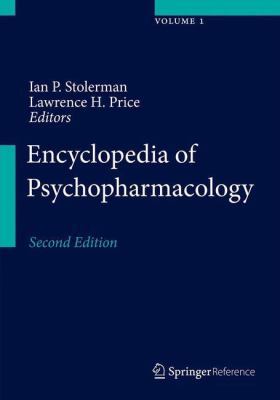

Charles Grob, OC ‘72 on hallucinogen treatment for advanced-cancer anxiety: Friday April 7, 12 noon.
In addition to the books shown here, all accessible online through OBIS, other books related to this topic are on display in the science library, including Psychopharmacology : drugs, the brain, and behavior / Jerrold S. Meyer, Linda F. Quenzer
#oberlin college libraries#oberlin college psychology#oberlin college neuroscience#oberlin college biology#oberlin college alumni#psilocybin#hallucinogen#cancer anxiety
0 notes
Text
Alumni Spotlight: Nicholas Music ’18, tenor
Nicholas Music ’18 has always loved winter term in Oberlin. It all began when he dove head-first into the role of Tenor II in Jeremy Beck’s Review during his first winter term on campus. That same month, he landed a starring role in a campus production of Jake Heggie’s one-act opera Again, which tells the off-screen story of Lucille Ball and Desi Arnaz from the iconic I Love Lucy show.
“Taking on the role of Ricky was a huge challenge for me but an extremely valuable part of my education,” Nicholas says. He spent three of the next four January terms on campus participating in Oberlin’s annual winter term production or preparing a role for the spring opera. Just last year, that project was Angel’s Bone, the Pulitzer Prize-winning opera by Du Yun ’01.
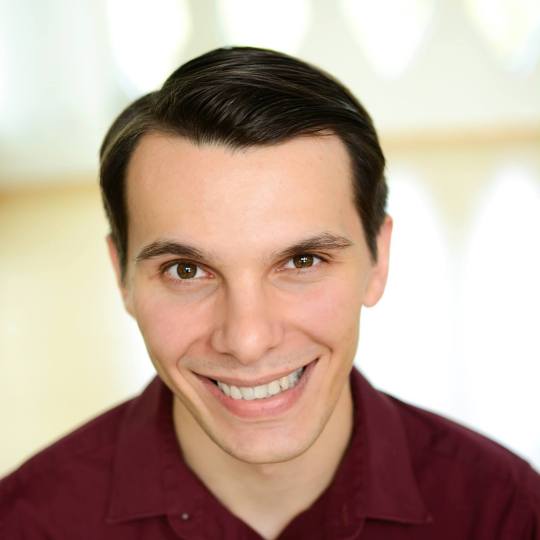
Although he has graduated from Oberlin and is working on his master’s at the University of Michigan, Nicholas still will be on campus this month—this time to prepare for his role as guest soloist with the Oberlin College Choir in Stravinsky’s Les Noces. The ensemble will perform the piece on January 19 at New York’s Carnegie Hall, with a preview performance slated for Oberlin on January 16.
“I consider it an immense privilege to take part in this series of performances culminating in my Carnegie debut!” Nicholas says. “It is an opportunity that I have only dreamed of until now, and it’s even more of a joy that I get to join my friends and peers from Oberlin.”
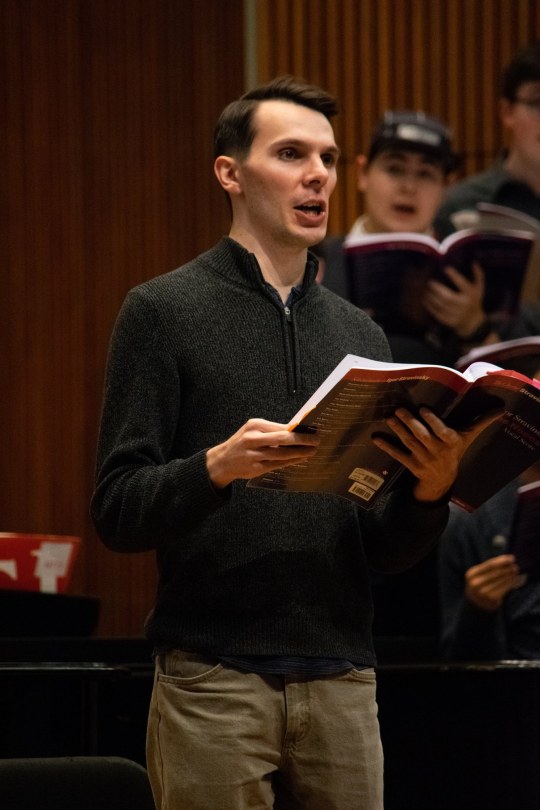
Singers and instrumentalists of all levels consider Les Noces a tricky piece of repertoire. “This is my first time singing in Russian,” Nicholas says, “and with the pace of the piece, there is no time to second-guess diction.”
The young singer’s experiences in Oberlin—especially with Du Yun, who visited campus to work with cast members in January 2018—have fueled his ongoing passion for opera. Angel’s Bone had been performed only once before, so with nothing more than an audio recording of the original cast for a compass, Nicholas found portraying the role of Boy Angel a highly creative endeavor.
“Du Yun took time to coach everyone individually and even met with us as a cast to talk about her journey and vision,” he says. “My coaching with Du Yun was not at all what I expected. As classical singers, we aim to sing every pitch and rhythm as accurately as possible…I was surprised to hear from her that the notation in many places was meant to be more of a guide than a mandate.
“Du Yun encouraged me to explore more freedom with the notation and to just feel how the emotional journey of the character motivates the music. I think her work with the cast was something none of us will forget.”

Head to oberlin.edu/oberlin-in-nyc for tickets and complete details about the Oberlin College Choir’s January 19 appearance at Carnegie Hall!
______
ABOUT OBERLIN IN NYC
The Oberlin Conservatory of Music is a world leader in the training of professional musicians. On January 16 and 19, 2019, three Oberlin ensembles will present notable programs in New York City’s iconic venues.
Leading the way on Wednesday, January 16, is the inaugural performance of the Oberlin Sonny Rollins Jazz Ensemble at Dizzy’s Club Coca-Cola with award-winning guest pianist Sullivan Fortner, a 2008 Oberlin Conservatory alumnus.The Oberlin College Choir and Oberlin Orchestra share the stage on Saturday, January 19, at Carnegie Hall’s Stern Auditorium in a showcase program that includes Stravinsky’s dramatic and rarely performed Les Noces.
#oberlin conservatory#music#classical#opera#voice#choir#orchestra#carnegie hall#concert#new york city#oberlininnyc#oberlininnyc2019
1 note
·
View note
Text
#WCW: Willa Beatrice Player
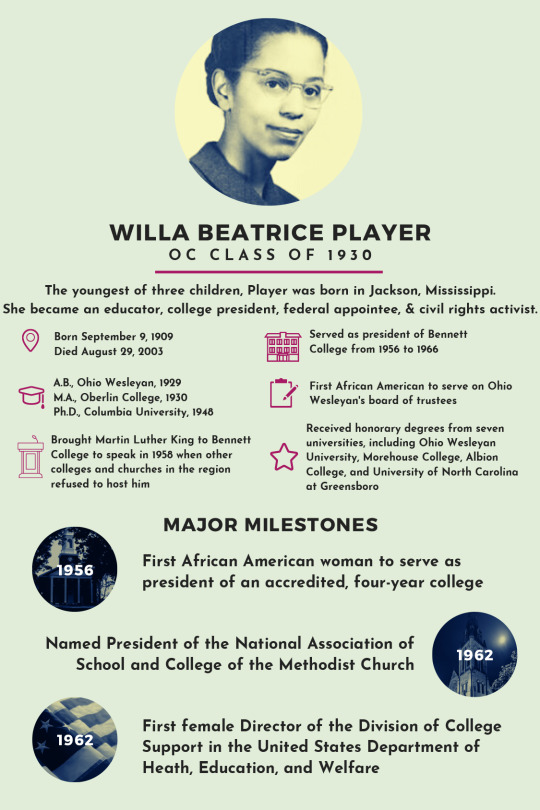
Above photo: Infographic depicting the information about Willa Beatrice Player written in this post.
Willa Beatrice Player, OC Class of 1930
The youngest of three children, Player was born in Jackson, Mississippi. She became an educator, college president, federal appointee, & civil rights activist.
Born September 9, 1909; Died August 29, 2003
A.B., Ohio Wesleyan, 1929; M.A., Oberlin College, 1930; Ph.D., Columbia University, 1948
Brought Martin Luther King to Bennett College to speak in 1958 when other colleges and churches in the region refused to host him
Served as president of Bennett College from 1956 to 1966
First African American to serve on Ohio Wesleyan’s board of trustees
Received honorary degrees from seven universities, including Ohio Wesleyan University, Morehouse College, Albion College, and University of North Carolina
MAJOR MILESTONES
1956- First African American woman to serve as president of an accredited, four-year college
1962- Named President of the National Association of School and College of the Methodist Church
1962- First female Director of the Division of College Support in the United States Department of Health, Education, and Welfare
#oclwomeninleadership#wcw#Oberlin College#Oberlin College Alumni#Obies#women in leadership#Willa Beatrice Player#OCLWomanoftheWeek
8 notes
·
View notes
Text
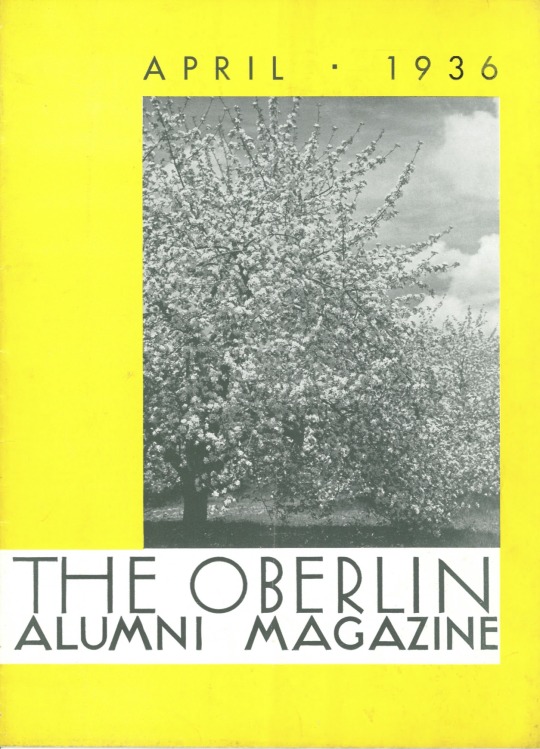



Springtime Scenes from the Oberlin Alumni Magazine
The trees and flowers are blooming and the weather is finally (somewhat) cooperating in Oberlin, so that means spring is here! I know a lot of you can't be on campus right now due to the ongoing COVID restrictions to enjoy the weather, but these springtime covers of the Oberlin Alumni Magazine can bring you right back from the comfort and safety of your own home.
Did you know archival issues (from 1904 to 1960) of the Oberlin Alumni Magazine have been digitized? You can get a taste of Oberlin from anywhere here. The magazine is an amazing source for articles about Oberlin College and community history (my favorite being the article in the February 1932 issue covering John Brown's connection with Oberlin College).
Please contact us if you are looking for an article or two from issues that haven't been digitized yet, and if you have any other questions!
#Oberlin#Oberlin College Archives#Oberlin College Libraries#Oberlin Alumni Magazine#Spring#Bikes#OCL Access Without Borders#Archives
10 notes
·
View notes
Link
A great example of how Obies are making a difference in their communities. Learn more about the summer day camp founded by Corene Spero '98 that teaches girls about art, leadership, and confidence.
1 note
·
View note
Text
Caroline Still Anderson-First African-American-Woman physician-#Women’s History Month

Caroline Still Anderson was one of the first African-American women to become a physician. She was born on November 1, 1848 in Philadelphia, Pennsylvania. Her parents were Letitia and William Still, two leaders in the abolitionist movement. William Still played an important role in the Underground Railroad of Philadelphia.
Caroline attended several prominent schools in Pennsylvania, as her father believed in a good education for women and his business in the coal industry provided well for the family.
At the age of 19, Caroline was the only black student in her class at Oberlin College to graduate with a bachelor’s degree. She was also the first black woman to be elected as president of the college.
On December 28, 1869, Caroline married Edward Wiley, a former slave and graduate of Oberlin College, at the age of 21. The couple had five children, but only three survived to adulthood. Edward died in 1873 from a sudden illness and in 1880, Caroline remarried Matthew Anderson, a minister and fellow alumni of Oberlin Colege, as well as Yale University and Princeton University.
After working as a teacher of music and elocution, Caroline went on to complete an internship in medicine at New England Hospital for Women and Children in Boston. After some opposition because of her race, Caroline was eventually appointed to a position at the hospital based on her work and talent as a physician. She went on to practice medicine at Quakers Institutions in Philadelphia.
In her later years, Caroline became an activist working for organizations in Philadelphia that supported women’s rights and racial equality. She was instrumental in establishing the first black Young Women’s Christian Association (YWCA) in Philadelphia. Caroline continued to work tirelessly to help the black community in Philadelphia until her death in 1919, and was recognized for her efforts by W.E.B. Du Bois.
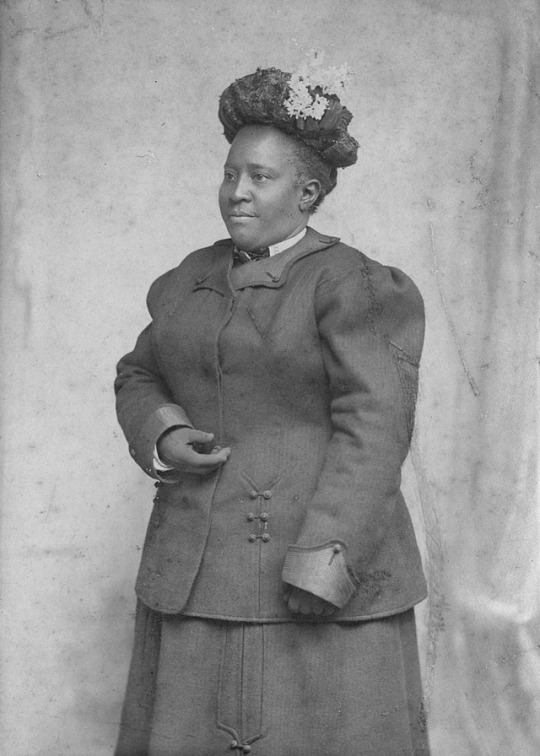
She died at the age of of 71 from stroke complications and was buried in Eden Cemetery in Collingdale, Pennsylvania.

#caroline still anderson#black history#civil war#civil rights#womens rights movement#philadelphia#abolitionists
33 notes
·
View notes
Text
Frances Lydia Yocom

Today’s post was written by Lorna Peterson, who is also the source of our posts on Betty Jenkins (2017), Clare Beck (2017), Aurelia Elizabeth Whittington Franklin (2016), Leaonead Pack Drain-Bailey (2015), and Clara Stanton Jones (2014). The image above is from “Small in Stature, Great in Spirit: A Tribute to Frances Yocom” by Betty Bolton, which appeared in North Carolina Libraries Volume 22, Number 3 in 1964.
Born in Pennsville, Morgan County, Ohio, on May 13, 1899, librarian Frances Lydia Yocom’s contributions to librarianship are many, but most notably are marked by her thoughtful, groundbreaking works on subject retrieval of research about and by African Americans, her book reviews of works concerning African Americans, and her bibliographies, which preserve for us titles that without her documentation would likely remain lost to future readers.
Her published works provide a bibliographic foundation for understanding the complexity of subject information retrieval, controlled vocabulary, and implicit bias. Notably, her Berkeley MA thesis published as A list of subject headings for books by and about the Negro, by the H.W. Wilson Publishing Company in 1940 and cited in Arna Bontemps 1944 Library Quarterly article “Special Collections of Negroana is one such seminal work. Her 1942 review of The Negro Federal Government Worker by Lawrence J. W. Hayes in the Southern Economic Journal minces no words on discrimination and shortcomings of the Civil Service merit system as researched and described by the author Lawrence Hayes. In the same issue of the Southern Economic Journal Ms. Yocom reviews with great care and praise, Eliza Gleason’s The Southern Negro and the Public Library[1] which in turn has been cited by library historian Cheryl Knott.[2] These titles are just a few of the works published by a scholar who is in need of remembering and deserving of a deep, and rich, biography.
Who was this white woman who worked at historically black colleges and universities as well as predominately white institutions, and was a librarian who used her bibliographic skills in the crusade for racial justice? Who and what shaped her mission to live in a world of racial equality?
The Yocom family moved to Oberlin in 1907, where the father, Eli King Yocom owned a dry goods store with his brother Joseph. Frances attended Oberlin public schools; she graduated from Oberlin High School in 1917, and graduated from Oberlin College in 1921 with a major in English. Her obituary lists her having earned the Master of Arts degree from Columbia University Teachers College in 1925. Oberlin alumni magazines from 1927 and 1929 report on Ms. Yocom working at Straight College (a predecessor of Dillard University) as a librarian and also as an English teacher. Frances Yocom’s interest in librarianship was greater than in teaching, as evidenced by her move back to Ohio to work in a library. She is listed in the 1930 Census as living with her mother and working as a librarian at Oberlin College.[3] She also lived in Cleveland where she earned the B.S. in library science from Western Reserve University (now Case Western Reserve University) in 1931.
From Fisk University, Nashville Tennessee records, she is additionally listed in the teacher records/teacher reports for 1931-32, 1935-37. It is here that her friendship developed with Fisk University history professor Theodore S. Currier, who was such an important part of the enriched undergraduate education experienced by future librarian Aurelia Whittington, and her future historian husband John Hope Franklin, that Frances Yocom was mentor to Aurelia Whittington.[4] (Note: Lorna Peterson wrote about Aurelia Whittington Franklin for Women of Library History in 2017. --Ed.)
In 1939, Yocom earned the M.S. in librarianship from the University of California, Berkeley. Her MA thesis was “List of Subject Headings for Books by and about the Negro,” 1939, M.A. (California) as cited in “Graduate Theses Accepted by Library Schools in the United States from July, 1938, to June, 1945” by Dorothy Ethlyn Cole, Library Quarterly, Vol. 17, No. 1 (Jan., 1947), page 56.
The January 1946 issue of CRL News, lists Ms. Yocom as a Fisk University associate librarian and cataloger “for a number of years” who has taken a position at Humboldt State College, Arcata CA.[5] From Humboldt State College which is now Humboldt State University, Frances Yocom took a cataloging position at the University of North Carolina, Chapel Hill where she retired from in 1964. Her career at Chapel Hill was memorialized by Betty Bolton “Small in Stature, great in spirit: A Tribute to Frances Yocom ” North Carolina Libraries, Volumes 22, no.3, Spring 1964, pages 87-89.
After retirement, Frances Yocom returned to Oberlin, Ohio and later, moved into Copeland Oaks Retirement Community, Sebring, Ohio. From her obituary, it is stated she kept up an active correspondence with friends and former colleagues. One can only hope that the letters, diaries, and photos of this remarkable librarian have been preserved. This was a life rich in work, education, travel, living in various sections of the United States, and quiet social activism. She was involved in the American Library Association and attended its meetings. She presented at the Southeastern Library Association once it integrated. She is acknowledged in the works of some the nations foremost civil rights activists and historians—for example, Harry Emerson Fosdick[6] and John Hope Franklin. She was a librarian dedicated to civil rights and social justice, using the expertise of librarianship to make positive social change. Her story needs to be told.
Notes
[1] Yocom, Frances L. (1942) Review of The Southern Negro and the Public Library. Southern Economic Journal, 8 (April): 521–2.
[2] Knott, Cheryl The Publication and Reception of The Southern Negro and the Public Library, Race, Ethnicity and Publishing in America pp 51-76, Springer 2014.
[3] 1930 United States Federal Census [database on-line]. Provo, UT, USA: Ancestry.com Operations Inc, 2002; Original data: United States of America, Bureau of the Census. Fifteenth Census of the United States, 1930. Washington, D.C.: National Archives and Records Administration, 1930. T626, 2,667 rolls.
[4] Franklin, John Hope, Mirror to America, 2005, page 47.
[5] “New from the Field” College and Research Libraries, January 1946, vol 7, no 1, page 83.
[6] Miller, Robert Moats, Harry Emerson Fosdick: Preacher, Pastor, Prophet, Oxford University Press, 1985, page 572.
#tumblarians#library history#women's history#lorna yocom#catalogers#bibliographers#oberlin college#university of north carolina#fisk university#straight college#Columbia University#humboldt state college#american library association#southeastern library association#Aurelia Whittington Franklin#john hope franklin#civil rights#women of library history
8 notes
·
View notes